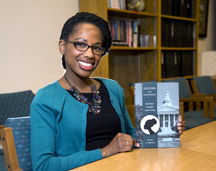Prof looks at political behavior, interests of 'Sisters in the Statehouse'
March 27, 2014
 |
|
Nadia E. Brown, an assistant professor in political science and African American studies at Purdue University is the author of "Sisters in the Statehouse: Black Women and Legislative Decision Making." (Purdue University photo/Mark Simons) |
WEST LAFAYETTE, Ind. — A closer look at black female state legislators' political behavior and community experiences shows that when they come together to support or oppose the same policies, their reasons can vary based on their age, religious beliefs or personal experiences, according to Purdue University research.
"To understand political behavior, we can't reduce any race or gender to a voting bloc," said Nadia E. Brown, an assistant professor in political science and African American studies whose research focuses on politics and power and the visibility of black women in politics.
Brown is the author of "Sisters in the Statehouse: Black Women and Legislative Decision Making" published this month by Oxford University Press. This is the first in-depth report that focuses on the individual perspectives of black female state legislators in Maryland and their political behavior on issues such as domestic violence, marriage equality, caring for the elderly and minority representation in business.
"Overall, although black women represent black women, they arrive at policy positions in different ways," Brown said. "My findings push back against the idea that one group all votes the same way for the same reasons. They act as a whole in some cases and independently in others. For example, younger black women were more likely to support marriage equality, and the older black women were not."
Brown's research focuses on the 20 black women serving in the 2009 Maryland state legislature. Brown conducted interviews, analyzed voting behavior and bill sponsorship, and sat in on hearings and meetings from 2009-2011. Eighteen of the 20 women participated in the in-depth interviews.
In 2013 there were 7,776 female state legislators in the United States, and 239 of these women were black.
"The number of black women in state politics may be small, but it is growing, and we need to see them as more than a voting bloc and rather as individuals effecting change and representing their constituents," Brown said. "This is a reminder to voters to not make assumptions about black women politicians or any politicians based on their demographics. And looking forward, I also will be studying black women in the 2014 and 2016 campaigns, specifically looking at their image and political behavior."
This research was funded by a variety of sources, including Purdue's Department of Political Science, the University of Hartford, the St. Louis University and Central European University. Brown also is an affiliate faculty member in women's, gender and sexuality studies program.
Writer: Amy Patterson Neubert, 765-494-9723, apatterson@purdue.edu
Source: Nadia E. Brown, 765-494-0460, brown957@purdue.edu
Related website:
College of Liberal Arts
